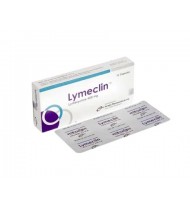Lymecycline
Indications
Lymecycline capsules belong to a group of medicines called tetracycline antibiotics. It is used to treat acne which appears as blackheads or whiteheads, which people often refer to as pimples or spots.
This medicine can also be used to treat other infections, such as:
This medicine can also be used to treat other infections, such as:
- Acute sinusitis
- Bronchitis
- Infections in the abdomen
- Some types of eye infections called trachoma
- Soft skin infections
Pharmacology
Lymecycline is a tetracycline derivative which blocks the access of bacterial aminoacyl-tRNA to the mRNA-ribosome complex by binding to the 30S ribosome subunit, preventing the addition of amino acids to the growing peptide chain in protein synthesis
Dosage
Adults and children over 12 years:
- Acne: the normal dose is one capsule once a day, preferably in the morning. Lymecycline capsules should always be taken with a glass of water. How long you will have to take Lymecycline capsules for will depend on how quickly your condition improves. For acne this will normally be a minimum of eight weeks.
- Infections: For other infections the usual dose is one Lymecycline capsule twice a day. Your doctor may recommend a higher or lower dose; this depends upon the type and severity of the infection. Ask your doctor if you are unsure. Lymecycline capsules should always be taken with a glass of water.
Administration
Should be taken on an empty stomach. Take 1 hr before or 2 hr after meals.
Interaction
Decreased absorption with Ca, Al, Mg, bismuth and zinc salts, antacids, bismuth containing ulcer-healing drugs, Fe preparations and quinapril. Increased effects of anticoagulants. Decreased plasma levels with barbiturates, phenytoin or carbamazepine.
Contraindications
Hypersensitivity to lymecycline or other tetracyclines. Overt renal insufficiency. Pregnancy and lactation. Concomitant use with methoxuflurane or oral retinoids.
Side Effects
Lymecycline capsules may also cause the following
side effects.
Common (occur in less than 1 in 10 patients):
available information):
side effects.
Common (occur in less than 1 in 10 patients):
- Feeling sick (nausea)
- Abdominal pain
- Diarrhoea
- Headache
available information):
- Eyesight disturbances
- Dizziness
- Being sick (vomiting)
- Yellowing of eyes or skin (jaundice)
- Increased sensitivity of the skin to sunlight (real or artificial)
- Increased pressure in the brain
- Changes in type or number of certain blood cells
- Pain in the upper part of the abdomen
- Changes in some blood tests (liver function tests)
- Fever
- Itchiness, skin rash, or hives
- Inflammation of the intestine
Pregnancy & Lactation
If you are pregnant or breast-feeding, think you may be pregnant or are planning to have a baby, ask your doctor or pharmacist for advice before taking this medicine. Lymecycline capsules must not to be taken if you are pregnant or breast feeding. Use of medicines such as Lymecycline capsules may affect the proper growth of developing teeth or bones, and lead to permanent tooth discolouration.
Precautions & Warnings
Patient with myasthenia gravis. May exacerbate SLE. Hepatic impairment.
Therapeutic Class
Tetracycline group of drugs
Storage Conditions
Store below 25° C. Protect from light.
Lymeclin Capsule 408 mg
IndicationsLymecycline capsules belong to a group of medicines called tetracycline antibiotics. It i..
30.00Tk.
Showing 1 to 1 of 1 (1 Pages)

